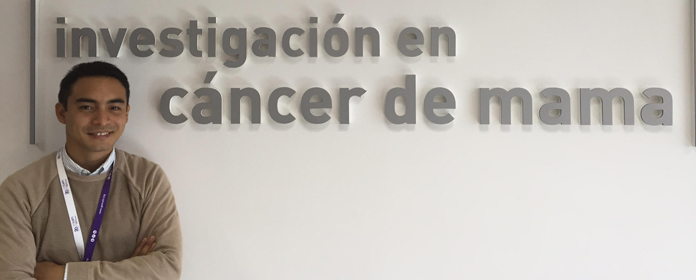"Neither robe biologist, nor boot biologist."
Ronald Maguiña studied Biology and the Master's Degree at research, development and Drug Innovation (MIDI), which opened the doors to investigate breast cancer at GEICAM.

PHOTO: Courtesy
Ronald Maguiña (Bio '10, MIDI 11) came from Peru to study Biology at the University of Navarra. He liked the experience so much that he continued his specialization program with the Master's Degree at research, development and Drug Innovation (MIDI). Now, as part of the team fighting breast cancer at the Spanish group of research GEICAM, she is clear that training not only gave her knowledge, but also the values and principles "that help us to be better professionals, to humanize and understand the different situations that arise in life and in the degree program professional.
What are you currently working on?
For the last four years I have been a Clinical Research Associate (CRA) at the Spanish Breast Cancergroup research (GEICAM). My work consists of monitoring clinical trials in breast cancer, among other things.
What has the Degree in Biology given you to carry out your professional degree program ?
The Degree in Biology provided me with the necessary tools and experiences to acquire the knowledge required for my work as a clinical trial monitor. The Degree provided me with the necessary skills to perform my work with a global vision, which is necessary in the world of clinical research . A biologist is not only useful to be behind a microscope, but is also capable of performing many tasks related to different professional fields.
What about the specialization at research, development and MIDI drug innovation?
The postgraduate program of the School of Pharmacy was a great complementary experience to my degree program of Biology. With it I learned to be a professional in many ways, and I met great professors, of whom I have very fond memories. Actually, the Master's Degree was the core topic final to enter the position I hold in GEICAM as CRA. I highly recommend it because it allows you to see and learn about the great world of the pharmaceutical industry from different perspectives.
What was different about your training at the University of Navarra?
Navarra is my "alma mater", the place where I learned and forged myself, not only as a professional but also as a person. The academic training , which is of a high level and has excellent teachers, goes hand in hand with a training in values and principles that financial aid us to be better professionals and, why not say it, to humanize and understand the various situations that arise in life and in the professional degree program .
Are there careers with opportunities or people with opportunities?
I am among those who think that there are people with opportunities and not careers with opportunities. Perhaps in the current labor scenario, one thinks over and over again about which degree program to choose, based on the job opportunities one may have in the future and without thinking so much about the options of applying the knowledge acquired. I believe that there are no rules that guarantee success, it all depends on the conviction of each person and knowing that they are capable of achieving great things. In my case, I do not consider myself a boot or gown biologist. I am a professional who has found a professional outlet in biology.
What do you think are the main challenges for scientists in your area of work?
I think that in the world of clinical research , and specifically in the world of clinical trials, there is still a long way to go. We have the responsibility to continue working every day to achieve a quality research that allows us to make the best cutting-edge therapies available to patients.




